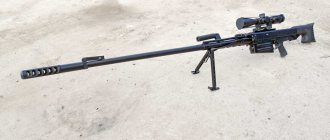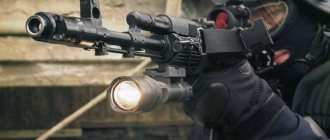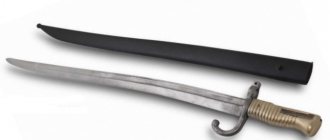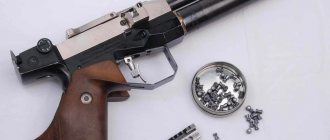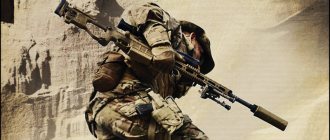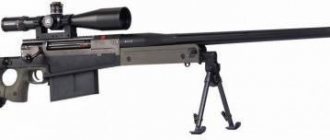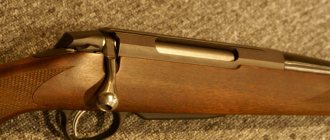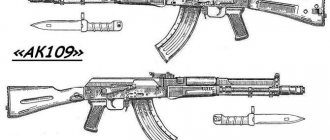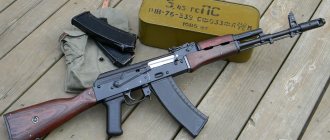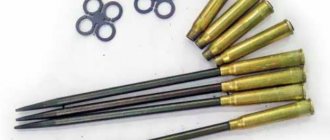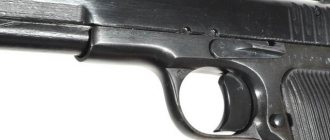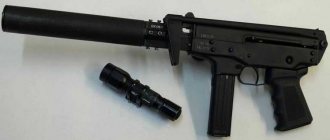Hunting carbine OSK-88 (SVT-40) caliber 7.62 mm. Device
If a military history buff picks up the OSK-88 self-loading hunting rifle, it may seem quite familiar to him. And there is nothing surprising in this, since under the symbol OSK-88, specialized hunting stores sold SVT-40 combat rifles produced during the Second World War. Most of the rifles produced in the USSR and put on sale at one time took part in battles against the Nazis, and some SVT-40s ended up in service with the Wehrmacht after the seizure of military warehouses on the USSR border in June 1941.
OSK-88 (SVT-40) year of manufacture 1941. The wood was changed, a PO 4x34 sight was installed. The caliber passed 7.69 mm
The SVT-40 rifle, which later became the OSK-88, was developed by Fedor Tokarev on the basis of the SVT-38 rifle adopted by the Workers 'and Peasants' Red Army. By and large, the SVT-40 is not an independent design, but only a deeply modernized SVT-38. The 1938 model received its baptism of fire on the Karelian Isthmus during the Winter War. The biggest complaints were caused by the unreliable operation of the gas venting mechanism at low temperatures, which resulted in automatic failure: the cartridge case was not removed from the chamber, and a new cartridge was not sent. Among other reasons, the low technical training of the shooters, who were sent to the front after minimal training, was also cited. As a result of the campaign, the designer received an order to modify the rifle. The Tokarev rifle of the 1940 model SVT-40 was more reliable and even somewhat easier to use, but still remained quite demanding in terms of maintenance and did not forgive mistakes of its owners.
Despite the fact that the principle of operation of the SVT-40 automation system can be understood by anyone with minimal technical education, there weren’t even many such shooters in the Red Army at that time. There were also incidents: soldiers who received the SVT-40 as a personal standard weapon could not disassemble it for cleaning and adjust the gas release mechanism. It is for this reason that the production of Mosin rifles and carbines continued.
The SVT-40 rifle remained in service only in special units of the army and navy, as well as among snipers, where “Sveta” (that’s what Soviet soldiers called the rifle) was held in high esteem as an accurate and powerful weapon. Sadly, the Tokarev rifle was first appreciated by the enemies of the Soviet Union - Nazi Germany and Finland. In the last days of June 1941, with the start of Operation Barbarossa, the Wehrmacht and SS troops captured a huge number of SVT-40 rifles, with which German units began to arm themselves. Immediately after the end of World War II, the SVT-40 was forgotten. The rifles remaining in the army were mothballed and placed in strategic warehouses.
Now Tokarev rifles are sold under the symbol OSK-88. Many hunters who use them complain about the unstable operation of the automation at low temperatures. What can we say... Perhaps we need to spend a little more time caring for this truly wonderful rifle. I think the reader will also be interested to know that the Tokarev system produced not only SVT-38 and SVT-40 self-loading rifles, but also AVT-40 rifles and SKT-40 and AKT-40 carbines. The AVT-40 rifle differs from the SVT-40 in the ability to conduct fully automatic fire. The SKT-40 and AKT-40 carbines differ from the corresponding rifles only in their shorter barrel length. Only semi-automatic rifles are sold as hunting weapons under the symbol OSK-88. According to hunters, the OSK-88 has excellent combat accuracy, even when using open sights, and when installing optics it becomes a truly sniper weapon. However, a serious obstacle to the installation of optical sights is the almost complete absence of mounting brackets on the arms market. It is also difficult to find an optical sight for the OSK-88 rifle: practically only Soviet PE and PU sights from the Second World War can be installed on it.
New in blogs
A unique weapon has fallen into our hands - the legendary Tokarev self-loading rifle. There are quite a large number of civilian versions of this rifle on hand, so we couldn’t miss the opportunity to test it in real conditions.
PSVT-40 (more precisely, OSK-88 - that’s what it’s called in civilian life) is an ideal, from the seller’s point of view, example of a conversion weapon: the changes made to the design in accordance with the requirements of the Law “On Weapons” are minimal, while the buyer receives a semi-automatic rifle chambered for a powerful cartridge. Do these theoretical calculations correspond to reality?
We hold it in our hands
A long and lean rifle with a predatory ribbed gas release mechanism above the barrel and a muzzle brake looks very aggressive. The harmony of the design is somewhat disrupted only by the store protruding from below. The appearance of the rifle evokes associations with a kind of predatory fish, for example, a pike.
The wood on the rifle is well preserved, only small scratches and chips are visible, which, given the venerable age of the rifle, is not surprising. The metal is in good condition, no traces of rust. Apparently, before being sold from warehouses, it was re-coated so that the coating looks like new.
The grip of the stock is quite normal, but only when shooting from static positions. For maneuverable actions, especially in the forest, the rifle is inconvenient - it is too long and heavy.
The fuse is located behind the trigger and moves in a transverse plane.
The sighting devices are conventional, mechanical: a front sight with a guard and an adjustable rear sight with graduation at 1500 m. There are no standard brackets for optics.
The magazine itself is steel, flat, double-row. Unfortunately, only one magazine came with the rifle, and it is quite difficult to get it on the secondary market.
Equipping the magazine with cartridges does not present any difficulties. It is also possible to load the magazine using clips inserted into a groove on the bolt. Moreover, the clips used were standard ones from a Mosin rifle (for five rounds).
Let's shoot
On the day when the test was carried out, the thermometer showed -20C. The rifle was prepared for shooting - the preservative grease was removed, the gas regulator was set to the middle position (the regulator has only 5 possible positions).
Shooting was carried out by two shooters from a rest position in a “sitting” position.
The very first shots revealed problems with the operation of the automation: it simply refused to function, and the rifle had to be reloaded manually each time. It was decided to continue firing in this mode without changing the position of the gas regulator. After a dozen shots, the rifle “warmed up” and the automation began to work at least two or three times. Apparently, powder carbon clogged the valve for removing excess gases, as a result of which the pressure in the gas exhaust system increased slightly. However, this was clearly not enough: delays occurred frequently, and once the bolt, barely touching the spent cartridge, sent it back into the chamber!
During the shooting, about 60 shots were fired, a good quarter of which were delayed. In addition to those caused by automation, 3 misfires were noted.
Since the rifle did not have an optical sight installed, we initially fired at 50 m. Noting that the results were quite satisfactory, we decided to shoot at a distance of 100 m at a standard chest target.
We do not present targets for one simple reason - as a result of the unstable operation of the automation, with each new shot the point of impact dropped down. Although at the very beginning, when shooting in “manual” mode, quite acceptable groups of approximately 60 mm were obtained, which is a very good result for a rifle without optics installed on it.
Among other problems, we note that the magazine falls out for no apparent reason.
The recoil of the rifle, even despite the metal butt plate, seemed very soft to us, close to the level of the SKS-45. This is one of the few advantages of the rifle.
The rifle triggers with a warning, the stroke length is average.
The shooting was carried out with shell cartridges produced by the Barnaul Machine Tool Plant with a bullet weighing 12 g.
conclusions
The main problem with the rifle is the complexity of the automation. Imagine that you need to carefully monitor the weather and reconfigure the gas regulator every time before shooting. Let us also add that this must be done with a special key, which is very easy to lose. However, there is no guarantee that you have configured the gas regulator correctly.
The danger of finding yourself with a non-functional weapon, due to incorrect settings, face to face with an enemy (or a ferocious beast) kills any desire to get involved with OSK-88. Modern semi-automatic machines (Tiger, Saiga and even SKS) are completely devoid of such “architectural excesses” and work under any conditions.
It was precisely for the complexity of setting up this system (adding to this the modest educational level of ordinary Red Army soldiers in the early 1940s) that the SVT-40 was criticized in the Red Army. References to the fact that the weapon needs to be cleaned on time and everything will work perfectly are simply unconvincing in this case.
In general, the weapon should function without additional “shamanic” movements - there is always a high probability that the user (shooter) will do something wrong. According to the famous Murphy's law, the user will definitely do everything wrong.
We may be reproached for the fact that we took a far from fresh copy, but who can get the OSK-88, as they say, “out of the box”? And in the hands of Red Army soldiers, the rifle quickly lost its original appearance.
Another important drawback of the rifle is the difficulty of installing a bracket for an optical sight. Specialized Internet resources are littered with advertisements like “I’ll buy a PU bracket for SVT,” which indicates that this problem has not been resolved.
The weapon is of historical interest, but only in its original form. Sooner or later, problems may arise during re-registration - trace formation is no different from combat samples, and marks also do not remain on the cartridges. Most likely, the owner of the OSK-88 will be required to install a mark-forming pin in the barrel. In this case, the historical value of the weapon will be lost, not to mention the deterioration of its ballistic properties.
If you are still determined to purchase an SVT, then we recommend using the rifle as a weapon for sport and recreational shooting, but not as a hunting weapon.
Nikolay Dergachev Alexander Kudryashov K@LIBR
Photo OSK-88
OSK-88 (SVT-40) 1940 according to the 1989 passport.
Similar
AK-47 assault rifle cartridge caliber 7.62 mm. Device. Rate of fire
AK-74 assault rifle cartridge caliber 5.45 mm. Device. Rate of fire
Dragunov SVD sniper rifle caliber 7.62 mm. Device
AKS-74U assault rifle cartridge caliber 5.45 mm. Device. Weight
Mauser K96 pistol cartridge caliber 7.63 and 9 mm. Device
Pistol Walter PP / PPK cartridge caliber 7.65 and 9 mm. Device
Pistol Yarygin PYa Grach cartridge caliber 9 mm. Device
DShK machine gun cartridge caliber 12.7 mm. Device. Rate of fire
Luger pistol R.08 Parabellum cartridge caliber 9 mm. Device
Pistol PM cartridge caliber 9 mm. Rate of fire. Dimensions. Bullet speed. Sighting range
Self-loading shotgun Saiga-12 cartridge, caliber. Device
Maxim machine gun cartridge caliber 7.62 mm. Device. Weight
PPSh-41 Shpagina submachine gun cartridge caliber 7.62 mm
APS Stechkin pistol cartridge caliber 9 mm. Device
Nagan system revolver cartridge caliber 7.62 mm. Device
Kalashnikov PK machine gun and PKM cartridge caliber 7.62 mm. Device
Simonov carbine SKS-45 cartridge caliber 7.62 mm. Device
Rifles and carbines Mauser 98 caliber 7.92 mm. Device
PPS-42 and PPS-43 Sudaev submachine gun cartridge caliber 7.62 mm
Pistol Walter P38 cartridge caliber 9 mm. Device
MP-40 German submachine gun cartridge caliber 9 mm. Device
VSS Vintorez sniper rifle caliber 9 mm. Device
Submachine gun PP-91 Kedr cartridge 9 mm caliber. Device
Light machine gun RPK-74 cartridge caliber 5.45 mm. Device
Pistol Glock 17 cartridge caliber 9 mm. Device
Makarych, Izh-79-9T, MR-79-9TM, MP-80-13T traumatic pistol
AK-12 assault rifle cartridge caliber 5.45 mm. Device. Weight
Mosin rifles and carbines Three-line caliber 7.62 mm
PMM Makarov pistol modernized 12 rounds. Device
Revolver Colt Single Action Army (SAA) Peacemaker. Device
Machine gun PKP Pecheneg cartridge caliber 7.62 mm. Device
Sniper rifle VSSK Exhaust caliber 12.7 mm. Device
Beretta pistol 92 cartridge caliber 9 mm. Device
TT - Tokarev pistol cartridge caliber 7.62 mm. Device
Submachine gun PP-19 Bison cartridge caliber 9 and 7.62 mm. Device
Sniper rifle SV-98 caliber 7.62 mm. Device
Vladimirov KPV machine gun cartridge caliber 14.5 mm. Device
ASH-12 assault rifle cartridge caliber 12.7 mm. Device. Rate of fire
PSM pistol cartridge caliber 5.45 mm. Device
Pistol Colt M1911A1 cartridge caliber 45. Device
Smith-Wesson revolver Russian cartridge, caliber 10.67 mm. Device
Degtyarev DP-27 light machine gun, 7.62 mm caliber cartridge. Device
Shotgun Mossberg 500 Cartridge. Dimensions. Rate of fire. Sighting range
Thompson submachine gun cartridge caliber 11.43 mm. Device
Pistol USP Heckler und Koch cartridge, caliber. Device
Hunting carbine OSK-88 (SVT-40) caliber 7.62 mm. Device
AS Val silent automatic cartridge caliber 9 mm. Device
Submachine gun PP-19-01 Vityaz cartridge 9 mm caliber. Device
Machine gun Kord cartridge caliber 12.7 mm. Device. Weight. Sighting range
Osa - traumatic pistol cartridge, caliber. Device
AK-9 assault rifle cartridge caliber 9 mm. Device. Rate of fire
Degtyarev RPD light machine gun, 7.62 mm caliber cartridge. Device
Automatic OTs-14 Groza cartridge caliber 9 mm and 7.62 mm. Device
Czech pistol CZ-75 (modifications). Device
Browning pistol 1903 cartridge caliber 9 mm. Device
Sniper rifle OSV-96 caliber 12.7 mm. Device
FN P90 submachine gun cartridge caliber 5.7 mm. Device
Submachine gun OTs-02 Cypress cartridge caliber 9 mm. Device
Sniper rifle ASVK Kord caliber 12.7 mm. Device
Automatic AEK-971 Cartridge. Caliber. Device. Rate of fire
Steyr AUG assault rifle (A1, A2, A3) cartridge caliber 5.56 mm
AK series 100 assault rifles. Modifications. Device. Weight. Dimensions
Uzi submachine gun. Cartridge. Caliber. Rate of fire
Pistol SR1M Gyurza cartridge caliber 9 mm. Device
Pistol GSh-18 cartridge caliber 9 mm. Device
SVDK sniper rifle caliber 9.3 mm. Device
Automatic SR-3M Whirlwind cartridge caliber 9 mm. Device
Machine gun NSV-12.7 Utes cartridge, cal. Device. Weight
Kalashnikov RPK light machine gun cartridge caliber 7.62 mm. Device
Sniper rifle VSK-94 caliber 9 mm. Device
Vostok-1 (Jorge-3M) 9mm caliber traumatic pistol. Device
Degtyarev PPD submachine gun cartridge caliber 7.62 mm
English sniper rifle L96A1 cartridge, caliber
M1 Garand rifle cartridge caliber 7.62 mm. Device
Desert Eagle pistol. Device
Smith-Wesson revolver (modifications). Device
Automatic rifle HK G36 (E, K, C, KE) cartridge caliber 5.56 mm
Pistol P-96 cartridge caliber 9 mm. Device. Rate of fire
Pistol GP35 Browning High Power cartridge, caliber. Device
Assault rifle FN SCAR (L, H) cartridge caliber 5.56 and 7.62 mm
Revolver Lefoshe M1856 cartridge caliber 11 mm. Device
Submachine gun PP-90 cartridge caliber 9 mm. Device
AN-94 Abakan automatic Nikonov cartridge caliber 5.45 mm. Device
Submachine gun PP-2000 cartridge caliber 9 mm. Device
Mauser pistol HSc cartridge caliber 7.65 and 9 mm. Device
M16 automatic rifle cartridge caliber 5.56 mm. Device
Fedorov assault rifle cartridge caliber 6.5 mm. Device. Rate of fire
Pistol Baltiets cartridge caliber 7.62 mm. Device
Strizh pistol cartridge caliber 9 mm. Device. Weight. Sighting range
Browning pistol 1910 cartridge caliber 7.65 and 9 mm
Silent pistol PSS Vul cartridge caliber 7.62 mm. Device
Pistol SIG-Sauer P226 cartridge caliber 9 mm. Device
Pistol OTs-27 Berdysh cartridge caliber 7.62 mm and 9 mm. Device
AK-107 assault rifle cartridge caliber 5.45 mm. Device. Rate of fire
OTs-44 sniper rifle, caliber 12.7 mm. Device
German machine gun MG3 cartridge caliber 7.62 mm. Device
Self-loading shotgun Browning Auto-5 cartridge, caliber. Device
Submachine gun AEK-919K Kashtan cartridge caliber 9 mm. Device
PB pistol silent cartridge 9 mm caliber. Device
Pistol OTs-33 Pernach cartridge caliber 9 mm. Device
Hunting carbine KO-98 cartridge caliber 7.92 mm. Device
TK (Korovin pistol) caliber 6.35 mm. Device. Weight. Dimensions
Underwater assault rifle APS cartridge caliber 5.66 mm. Device
Pistol OTs-21 Malysh cartridge caliber 9 mm. Device
American M60 machine gun, 7.62 mm caliber cartridge. Device
MTs-116M sniper rifle, caliber 7.62 mm. Device
Automatic 9A-91 cartridge caliber 9 mm. Device. Rate of fire
Submachine gun PP-93 cartridge caliber 9 mm. Device
VAG-73 - Gerasimenko pistol. Device. Weight. Dimensions
Cordon-5 is a traumatic pistol. Device. Weight. Dimensions
Goryunov SG-43 heavy machine gun cartridge caliber 7.62 mm. Device
Webley revolver cartridge, caliber. Device. Dimensions. Weight
Machine gun AEK-999 Badger cartridge caliber 7.62 mm. Device
RP-46 machine gun, 7.62 mm caliber cartridge. Device. Rate of fire
Sniper rifle VS-8 cartridge caliber 8.6 mm. Device
Slostin machine gun cartridge caliber 7.62 mm and 14.5 mm. Device
Assault rifle Tavor TAR-21 cartridge caliber 5.56 and 5.45 mm
Submachine gun SR-2 Veresk cartridge caliber 9 mm. Device
Lancaster pistol cartridge caliber 12.1 mm. Device. Rate of fire
Submachine gun PP-90M1 cartridge caliber 9 mm. Device
Underwater pistol SPP-1M. Device. Weight. Dimensions
Traumatic pistol MP-461 Guard. Device. Weight. Dimensions
Lebel rifles and carbines are cartridgeed in 8 mm caliber. Device
Automatic A-91 cartridge caliber 7.62 mm. Device. Rate of fire
M14 automatic rifle cartridge caliber 7.62 mm. Device
Revolver Smith & Wesson Model 10 Military & Police
Automatic rifle FN FAL cartridge caliber 7.62 mm. Device
Submachine gun STEN MK 2. Device. Weight. Dimensions
Traumatic pistol IZH-78-9T Chain mail cartridge caliber 9 mm
Leader-M traumatic pistol 11.43×32T. Device. Weight. Dimensions
Ingram M10 and M11 submachine gun. Device. Weight. Dimensions
Pistol Steyr M9-A1 cartridge caliber 9 mm. Device. Weight
Pistol OTs-23 Dart cartridge caliber 5.45 mm. Device
Berthier rifles and carbines caliber 8 mm. Device
Automatic shotgun USAS-12 cartridge caliber 18.5 mm
Sniper rifle VS-121 caliber 7.62 mm. Device
Traumatic pistol MP-353 cartridge, caliber 11.43 mm
Tiss machine gun cartridge caliber 9 mm. Device. Rate of fire
Traumatic pistol MP-355 cartridge caliber 9 mm. Device
Automatic double-medium ADS cartridge caliber 5.45 mm. Device. Rate of fire
Traumatic pistol MP-81 cartridge caliber 9 mm. Device
Pistols Zastava 70 and 70(k), cartridge caliber 7.65 or 9 mm. Yugoslavia
Sniper rifle GALATZ (Galil) cartridge caliber 7.62 mm
Pistol MP-444 Bagheera cartridge caliber 9 mm. Device
Revolver Colt New Army / Navy. Device. Bullet speed. Sighting range
Type 64 is a Japanese automatic rifle. Device
